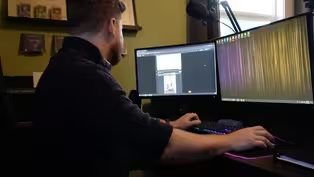
What China is trying to accomplish in U.S. airspace
Clip: 2/6/2023 | 7m 25sVideo has Closed Captions
What China is trying to accomplish with repeated incursions into U.S. airspace
The U.S. sent divers to salvage what they believe is spy equipment from the Chinese balloon shot down this weekend off the South Carolina coast. Chinese officials claim it was a civilian weather balloon that went off course. The Pentagon said it was clearly for surveillance and under the control of the Chinese government. William Brangham spoke with Susan Shirk about China’s possible strategy.
Problems playing video? | Closed Captioning Feedback
Problems playing video? | Closed Captioning Feedback
Major corporate funding for the PBS News Hour is provided by BDO, BNSF, Consumer Cellular, American Cruise Lines, and Raymond James. Funding for the PBS NewsHour Weekend is provided by...

What China is trying to accomplish in U.S. airspace
Clip: 2/6/2023 | 7m 25sVideo has Closed Captions
The U.S. sent divers to salvage what they believe is spy equipment from the Chinese balloon shot down this weekend off the South Carolina coast. Chinese officials claim it was a civilian weather balloon that went off course. The Pentagon said it was clearly for surveillance and under the control of the Chinese government. William Brangham spoke with Susan Shirk about China’s possible strategy.
Problems playing video? | Closed Captioning Feedback
How to Watch PBS News Hour
PBS News Hour is available to stream on pbs.org and the free PBS App, available on iPhone, Apple TV, Android TV, Android smartphones, Amazon Fire TV, Amazon Fire Tablet, Roku, Samsung Smart TV, and Vizio.
Providing Support for PBS.org
Learn Moreabout PBS online sponsorshipGEOFF BENNETT: The U.S. sent divers to salvage what they believe is spy equipment from the Chinese balloon shot down this weekend off the South Carolina coast.
William Brangham has the story.
WILLIAM BRANGHAM: Geoff, Chinese officials still maintain this was a civilian weather balloon that went off course and again criticized the U.S. for shooting it down.
But the Pentagon has rejected that claim, saying it was clearly for surveillance and under the control of the Chinese government.
Last month, the balloon entered U.S. airspace over Alaska, but it became public last week as it traveled over Montana and some U.S. military facilities, before continuing on towards the East Coast.
The balloon was shut down once it was over the Atlantic on President Biden's order and its thousands of pounds of falling debris post little hazard.
The Pentagon said another Chinese balloon has been detected over Latin America, and that at least three other Chinese balloons briefly crossed parts of the U.S. during the Trump administration.
Officials say their presence was not known at the time and only discovered by reviewing archived satellite imagery.
So, for more on China's possible strategy here, we're joined by Susan Shirk.
She's a longtime China analyst, and she chairs the 21st Century China Center at U.C.
San Diego.
Her latest book is "Overreach: How China Derailed Its Peaceful Rise."
Susan Shirk, thank you so much for being here.
The Chinese claim this is a weather balloon blown off course.
The Pentagon says that's not true.
It was clearly a surveillance device.
Where do you come down on that argument?
SUSAN SHIRK, University of California, San Diego: Well, I'm persuaded by what the Pentagon has to say.
I think weather device is just a cover story.
It may persuade some people in China, but certainly not internationally.
WILLIAM BRANGHAM: Help me understand something here.
Last week, Secretary of State Antony Blinken canceled a long-planned diplomatic mission to China because of this balloon.
Surely, the Chinese knew this balloon was going to be over the United States on the eve of this diplomatic mission.
So how do you explain that?
SUSAN SHIRK: Well, it certainly is a puzzle, because Xi Jinping and the Chinese government were eager to have Blinken go to China and to try to prevent this downward spiral in relations with the United States from continuing.
China has a lot of domestic problems right now.
Xi Jinping has a need to restore confidence in his leadership.
So they really did want him to come.
So this is very self-defeating.
And I conclude from that that's it's the result of poor internal coordination, and not a decision by Xi Jinping himself.
I think that Xi probably has approved this program of surveillance balloons, but I really doubt that he approved this particularly brazen effort to transverse the entire continental United States just a few days before Blinken was about to come.
WILLIAM BRANGHAM: President Xi, the way he's portrayed, at least in Western media, is as the most powerful leader China has had in decades and a sort of omnipotent, all-powerful leader.
So, if what you're describing is correct, how -- it seems to dent that image that he is this all-controlling, all-seeing leader.
SUSAN SHIRK: Well, yes.
And we had a lot of these problems of poor coordination in earlier periods in China, where you had a collective leadership, and the top leader didn't necessarily know what various bureaucracies were doing.
But, in the case of Xi Jinping, he has claimed full responsibility, and yet he hasn't organized a system in which he can control everything.
It's a big, complex, bureaucratic system.
And once he gives the green light to the program, subordinates do what they think Xi Jinping wants to do.
So, I mean, some people believe that there may be elements within the Chinese PLA who were trying to subvert the diplomacy.
But I think it's more likely that people were on kind of autopilot here and they just kept doing it.
And then the winds may have had something to do with it as well.
WILLIAM BRANGHAM: Reportedly, there were also failed attempts by U.S. officials to contact their Chinese counterparts when this balloon was circling the U.S. What does that -- this incident tell us about the superpowers' ability to talk when they need to talk when there's a potential crisis?
SUSAN SHIRK: Yes, I believe this is the most worrisome feature of the whole incident.
The Biden administration tried to consult with their Chinese counterparts.
Either the Chinese didn't answer the phone or they answered the phone, but said they needed more time.
Nobody feels they can take a position until Xi Jinping authorizes it.
That might have been part of the problem.
But, in any case, there -- our ability to coordinate during the crisis is really very poor and very worrisome.
WILLIAM BRANGHAM: As we mentioned, this trip by Blinken that was canceled that theoretically will happen again was to reduce tensions between the two nations.
Do you think those tensions can be reduced?
SUSAN SHIRK: I'm not sure.
I'm pretty agnostic on that question.
But I believe we have to test it.
And that's why I thought it was very positive that the president met Xi Jinping in Bali, that Blinken was going following.
And it would give us an opportunity to see whether or not Xi Jinping would be willing to moderate some of his more belligerent foreign policy, his repressive domestic policy in order to stabilize relations with the United States.
I really don't know the answer to that.
But I thought that we needed to try, especially at this time, when China's economy is on the ropes.
I mean, there are a lot of good reasons for Xi to want to moderate these policies in order to restore confidence and improve the Chinese economy.
WILLIAM BRANGHAM: All right, Susan Shirk of the 21st Century China Center, thank you so much for being here.
SUSAN SHIRK: My pleasure.
Thank you.
Calls for paid leave grow 30 years after passage of FMLA
Video has Closed Captions
Clip: 2/6/2023 | 6m 28s | Calls for paid leave grow louder 30 years after passage of Family and Medical Leave Act (6m 28s)
Grammy Awards showcase music world and offer up surprises
Video has Closed Captions
Clip: 2/6/2023 | 5m 59s | Grammy Awards showcase music world and offer up surprises (5m 59s)
Hundreds of migrant children remain separated from families
Video has Closed Captions
Clip: 2/6/2023 | 5m 46s | Hundreds of migrant children remain separated from families despite push to reunite them (5m 46s)
Online conspiracy theories led man to mental health crisis
Video has Closed Captions
Clip: 2/6/2023 | 4m 17s | Online conspiracy theories led man to mental health crisis (4m 17s)
Thousands dead in Turkey, Syria after powerful earthquake
Video has Closed Captions
Clip: 2/6/2023 | 8m 33s | Thousands dead in Turkey and Syria after 7.8 magnitude earthquake (8m 33s)
Women in Afghanistan find ways to make their voices heard
Video has Closed Captions
Clip: 2/6/2023 | 10m 52s | Women in Afghanistan find ways to make their voices heard under Taliban oppression (10m 52s)
Providing Support for PBS.org
Learn Moreabout PBS online sponsorship
- News and Public Affairs

FRONTLINE is investigative journalism that questions, explains and changes our world.

- News and Public Affairs

Today's top journalists discuss Washington's current political events and public affairs.












Support for PBS provided by:
Major corporate funding for the PBS News Hour is provided by BDO, BNSF, Consumer Cellular, American Cruise Lines, and Raymond James. Funding for the PBS NewsHour Weekend is provided by...





